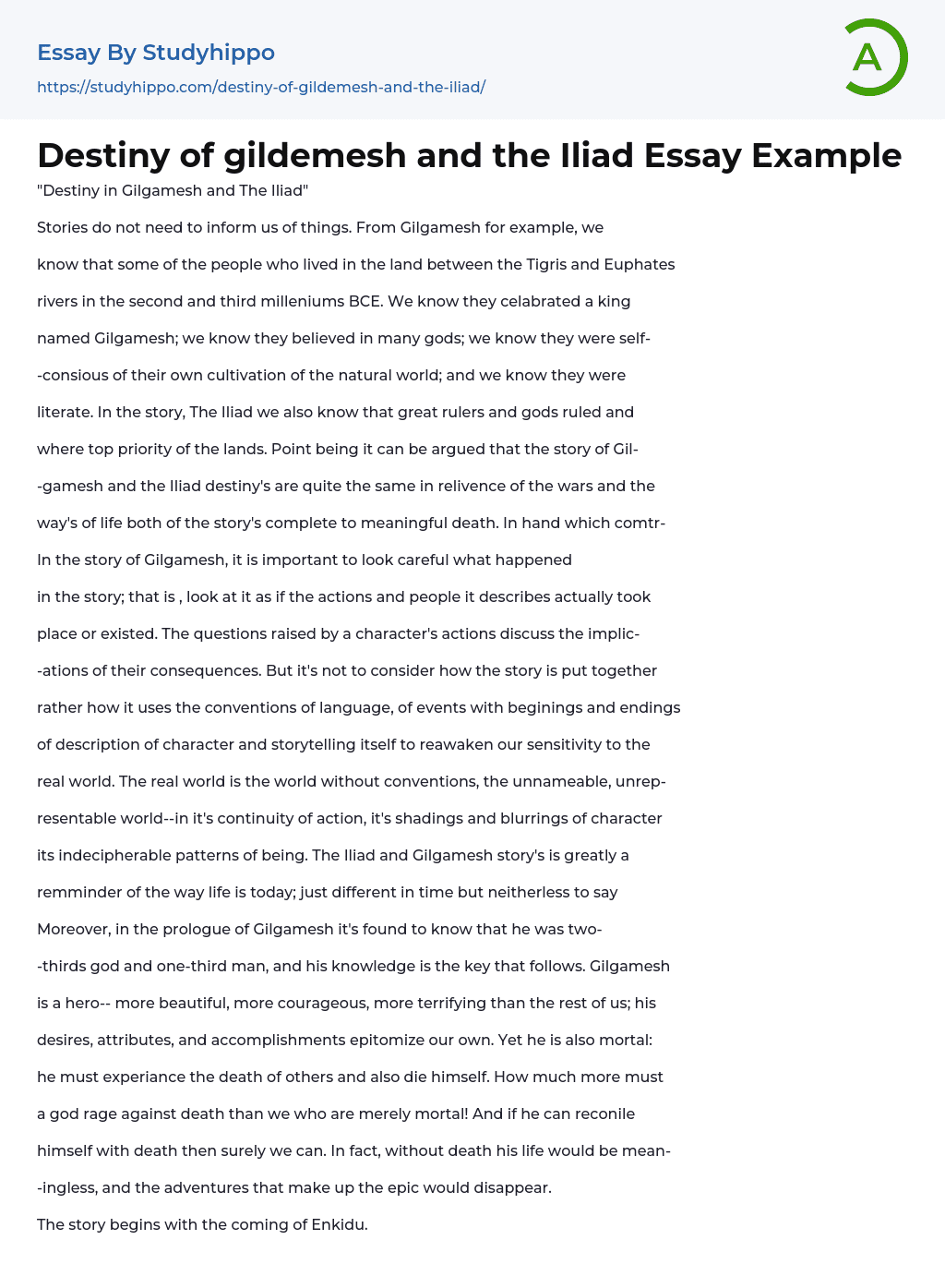"Destiny in Gilgamesh and The Iliad" delves into how these ancient stories provide insights into the people and cultures of their time periods. In Gilgamesh, we are introduced to the inhabitants of the land between the Tigris and Euphrates rivers during the second and third centuries BCE. These people worshipped multiple gods, celebrated their king named Gilgamesh, showed their understanding of cultivating nature, and possessed literacy skills. Similarly, The Iliad portrays a world where powerful rulers and gods held great importance over their lands. Both narratives emphasize the significance of warfare and depict ways of life that ultimately lead to meaningful deaths.
Gilgamesh's narrative urges us to closely analyze its events and characters as if they were real occurrences. By examining a character's actions, we can uncover the implications and consequences that result from them. While not crucial to the story's structure, i
...t effectively employs language conventions by narrating events with clear beginnings and endings, vividly describing characters, embracing storytelling. Through these techniques, Gilgamesh aims to revive our sensitivity towards the complexities of reality – an unconventional realm characterized by a continuous flow of actions, blurry characters, incomprehensible patterns.Both The Iliad and Gilgamesh, despite being from different time periods, reflect aspects of contemporary life. In the prologue of Gilgamesh, he is introduced as a two-thirds god and one-third man, which is a significant aspect in the story. Gilgamesh represents our desires, qualities, and achievements as he surpasses us in beauty, courage, and fearfulness. Although mortal himself, he witnesses others' deaths and eventually faces his own demise. While a god would despise death more passionately than mortals do, if Gilgamesh can find acceptance with death, then surely
we can too. Death gives meaning to his life and allows the epic adventures to exist.
The tale begins with Enkidu's arrival as a young man who is also a god. Even though Gilgamesh rules as their king in Uruk, he lacks empathy for its people and instead kills their sons and rapes their daughters. In response to the people's grievances, the gods create Enkidu as Gilgamesh's equal with hopes that they will bring peace to Uruk through contention. Initially leading to a fight between them when Enkidu prevents Gilgamesh from entering a bride and groom's house; however ,they eventually become friends. Together they journey into the forest to confront Humbaba despite his fearsome nature.
In the forest ,they support each other in facing their fears and acknowledge that all living beings must confront mortality.
Gilgamesh acknowledges that he cannot achieve immortality but believes his name will be remembered throughout history. As a result, he decides to go to a place where famous men's names are written down to establish his own legacy. This shift in focus leads Gilgamesh to prioritize the well-being of Uruk, his city, over his personal desires. The walls made from cedar in Uruk serve as evidence of Gilgamesh's fame. Additionally, Enkidu teaches Gilgamesh about various aspects of humanity such as love, compassion, loss, aging, and mortality. In contrast, the Iliad also revolves around war as its main theme. Unlike Gilgamesh's story, there are two opposing factions engaged in warfare against each other and even within their own families. The epic begins with a dispute between a Greek king and the chief warrior—a perspective on this war that stands out because it is primarily
triggered by a woman []. During this time period [], women were devalued and treated as objects—a widely accepted norm. The intensity of this conflict is so great that Zeus himself intervenes to provide assistance. Initially angered by Agamemnon (the Greek king) for refusing ransom for one of Apollo's priests' daughters [], Agamemnon reluctantly gives up the girl but demands Briseis instead—the concubine captured by Achilles—as compensation [].This passage introduces the central theme of "wrath of Achilles" in the epic, originally assigned to him. Achilles communicates his grievances to his mother Thetis, who persuades Zeus to support the Trojans until Achilles' honor is satisfied. The conflict between the Greeks and Trojans is characterized by the inevitable fate of characters destined for honorable deaths. In the Iliad, Hector leads an angry charge against the Greek wall while Poseidon opposes Zeus to assist the Greeks. Poseidon hinders Agamemnon from ordering a retreat, and Hera uses Aphrodite's magic girdle to seduce Zeus into slumber. Hector sustains a wound and is compelled to withdraw with his Trojan comrades, but an enraged Zeus awakens and dispatches Apollo to heal Hector's injuries. Later on, regretting not having retreated earlier, Hector confronts Achilles in single combat which ultimately results in his demise. To further dishonor him, Achilles fastens Hector's body to a chariot and drags it across the battlefield. Ultimately, similarities can be observed between Gilgamesh and The Iliad as both explore how characters navigate their own choices.
- Achilles essays
- Apollo essays
- Gilgamesh essays
- Hercules essays
- Iliad essays
- Myths essays
- Odysseus essays
- Oedipus essays
- Trojan War essays
- Zeus essays
- Acceptance essays
- Age Of Enlightenment essays
- Child Observation essays
- Confucianism essays
- Conscience essays
- Critical Reflection essays
- Destiny essays
- Determinism essays
- Empiricism essays
- Environmentalism essays
- Epistemology essays
- Ethics essays
- Ethos essays
- Existence essays
- Existentialism essays
- Fate essays
- Free Will essays
- Functionalism essays
- Future essays
- Good And Evil essays
- Human Nature essays
- Individualism essays
- Meaning Of Life essays
- Metaphysics essays
- Natural Law essays
- Personal Philosophy essays
- Philosophers essays
- Philosophy Of Life essays
- Political Philosophy essays
- Pragmatism essays
- Reality essays
- Relativism essays
- Teaching Philosophy essays
- Time essays
- Transcendentalism essays
- Truth essays
- Utilitarianism essays




